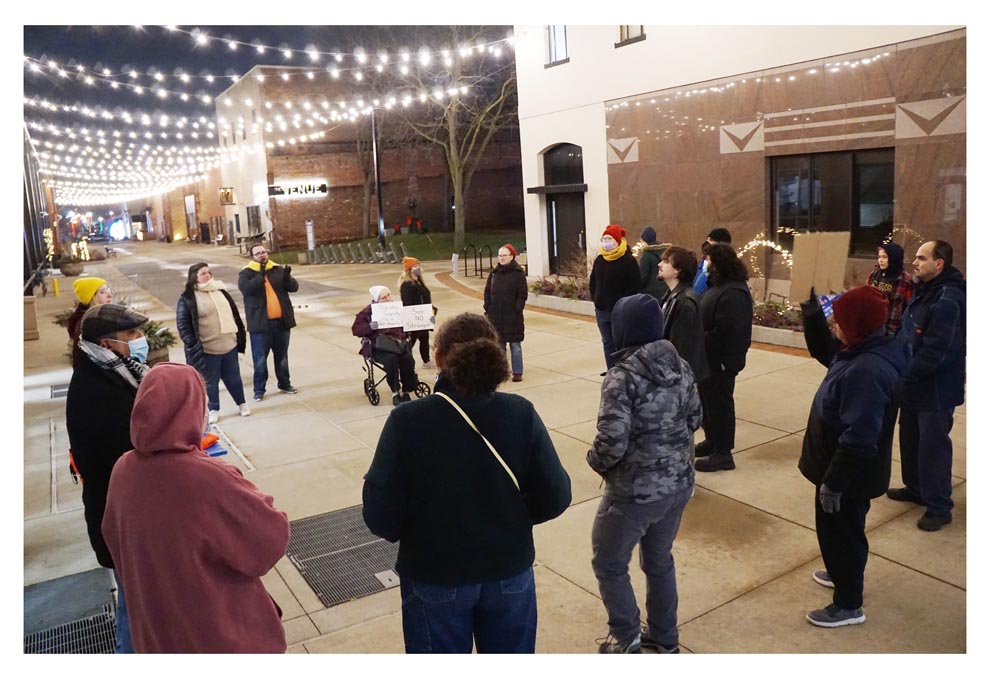By Jason Crane
With concern about migrants who were recently transported to the City without prior arrangements, the Aurora City Council convened Friday, Dec. 22, at noon, for a special City Council meeting to consider amending an Ordinance to define and prohibit unscheduled bus stops of individuals who are transported to the City without prior arrangements for their care and well-being.
City government of Aurora documents show beginning Monday, Dec. 18, busses carrying migrants from the State of Texas began to arrive in Aurora. Passengers on these busses disembarked at the Aurora Transportation Center and were encouraged to board Metra trains to Chicago. The City was made aware that other communities, including Joliet and Elgin, have become destinations for these busses as well.

The Council Chambers was crowded and more than a dozen speakers shared time within the allowed 30 minute total. Alderman-at-large John Laesch made a motion to increase the time to speak for each speaker. The motion failed to pass with a vote of 4 – 7.
There were a few outbursts at the meeting resulting in removal.
The speakers were either against the Ordinance or critical of the City for not offering more help to those seeking asylum.
Comments can be viewed on the city government of Aurora’s YouTube page after the 5 minute mark by clicking here.
The amendment to the Ordinance was approved 9-1 with alderman-at-large John Laesch voting against it and 3rd Ward alderman Ted Mesiacos voting as present and not for or against.
An Aurora government document states the City is not equipped to handle an influx of multiple busloads of persons arriving each day nor, given the time of year, is it acceptable for persons to simply be “dropped off” at a Metra station with few personal items, seasonally inappropriate attire, and no access to services. In fact, doing so puts the health and safety of these passengers at great risk.
At the direction of the Mayor’s Office, the Law Department prepared an ordinance which is modeled after ordinances already enacted in Chicago, Rosemont, Tinley Park, and under consideration elsewhere designed to ensure that those who are arranging for the transportation of these persons to Aurora have made arrangements for their care upon arrival.
The proposed ordinance requires transportation companies to notify the community services department at least five days prior to the arrival of a bus for approval to allow passengers to disembark in Aurora. An apparently unique aspect of the proposed ordinance is that rather than vesting authority in the Police Department to authorize bus arrivals, this authority will instead be placed within the chief community services officer.
Approval will be granted only upon presentation of a detailed plan identifying how the individuals being dropped off will be cared for, housed, and fed, either temporarily or permanently. Persons who make unscheduled / unpermitted drop-offs will be subject to fine and their buses will be subject to forfeiture under the City code.
City officials hope bus companies engaged in transportation of those who have migrated to the U.S. and those who have arranged for that transportation will take seriously the responsibilities imposed by this ordinance and will choose to fully comply with its provisions.
City government of Aurora documents show beginning in 2022, states bordering Mexico began experiencing an historic influx of undocumented migration of persons from Central and South America. Dissatisfied with the response of the federal government to this unprecedented situation, the governors of several states, including Texas, began to arrange for the transportation of these persons to states and cities which had declared themselves as “welcoming” or “sanctuaries” from the enforcement of federal immigration laws. The City of Chicago, which adopted a sanctuary city ordinance several years ago, became the destination for many of these migrants.
The arrival of these migrants created significant budgetary and resource issues in Chicago. After several months, the Chicago City Council responded by adopting polices and ordinances that attempted to restrict the times and locations busses carrying migrants could arrive and allow passengers to disembark. The transportation companies engaged by the southern states responded by rerouting to the communities that border Chicago and allowing their passengers to disembark there.
Mayor Irvin held a press conference after the meeting. His comments and answers to questions can be viewed on the city government of Aurora’s YouTube page by clicking here.

